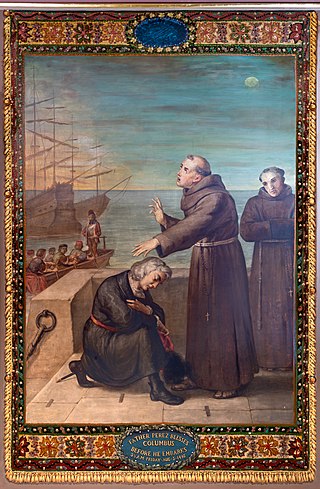Angelo da Clareno, also known as Angelo Clareno, was the founder and leader of one of the groups of Fraticelli in the early 14th century.
Peter John Olivi, also Pierre de Jean Olivi or Petrus Joannis Olivi, was a French Franciscan theologian and philosopher who, although he died professing the faith of the Roman Catholic Church, remained a controversial figure in the arguments surrounding poverty at the beginning of the 14th century. In large part, this was due to his view that the Franciscan vow of poverty also entailed usus pauper. While contemporary Franciscans generally agreed that usus pauper was important to the Franciscan way of life, they disagreed that it was part of their vow of poverty. His support of the rigorous view of ecclesiastical poverty played a part in the ideology of the groups coming to be known as the Spiritual Franciscans or Fraticelli.

Count Leopoldo Cicognara was an Italian artist, art collector, art historian and bibliophile.

Odoric of Pordenone, was a Franciscan friar and missionary explorer from Friuli in northeast Italy. He journeyed through India, Sumatra, Java, and China, where he spent three years in the imperial capital of Khanbaliq. After more than ten years of travel, he returned home and dictated a narrative of his experiences and observations called the Relatio, highlighting various cultural, religious, and social peculiarities he encountered in Asia.

Francisco Quaresmio or Quaresmi, better known by his Latin name Franciscus Quaresmius, was an Italian writer and Orientalist.
John of Parma was an Italian Franciscan friar, who served as one of the first Ministers General of the Order of Friars Minor (1247–1257). He was also a noted theologian of the period.
NicolasBonet was a Friar Minor, philosopher, theologian, missionary and bishop of Malta.
Flaminius Annibali de Latera was an Italian historian.

Matthew of Aquasparta was an Italian Friar Minor and scholastic philosopher. He was elected Minister General of the Order.
Johann Wild (Ferus) was a German Franciscan scriptural commentator and preacher.
David Castelli was an Italian scholar and educator in the field of secular Jewish studies. He was educated at the rabbinical college of Leghorn, and from 1857 to 1863 was teacher of Hebrew and Italian in the Jewish schools of that city. Then he became secretary of the Jewish congregation in Pisa, where at the same time he was a private teacher. From January 1876 until his death he occupied the chair of Hebrew at the Istituto di Studi Superiori Pratici e di Perfezionamento in Florence.
Marianus of Florence was a Friar Minor, historian, and chronicler of the Franciscan Order; born in Florence about the middle of the fifteenth century, exact date of birth uncertain; died there, 20 July 1523.
The College of St Bonaventure at Quaracchi, near Florence, Italy, is a publishing centre of the Order of Friars Minor.

Francesco Panigarola was an Italian Franciscan preacher and controversialist, and Bishop of Asti.

Juan Pérez, O.F.M. Conv., was a Spanish friar of the Conventual Franciscans and companion of Christopher Columbus.
Marcello Landi (1916–1993) was an Italian painter and poet.
The following is a timeline of the history of the city of Livorno in the Tuscany region of Italy.
The following is a timeline of the history of the city of Prato in the Tuscany region of Italy.
Giovanni Maria Lampredi was an Italian jurist, scholar, and writer, active in Tuscany. He is also remembered for his text on Etruscan culture.
Domenico Maria Manni was an Italian polymath, editor, and publisher.





